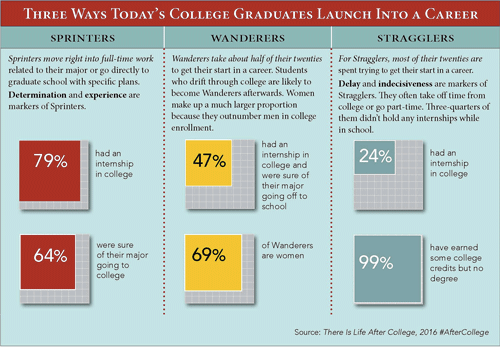 |
 |
03.22.17

5 Critical Skills You Will Need to Hit the Ground Running After College
J There is Life After College is a book that every student should read—twice. Frankly, it would hurt those already in the workplace to read it as the ground is shifting under our feet as well. Employers are looking for T-shaped individuals. The vertical bar represents depth of knowledge and the horizontal bar represents the ability to work across a variety of complex subject areas with ease and confidence. Something a liberal arts education is designed to do. Selingo notes that too many undergraduates want to be spoon-fed. “They sit back and wait for professors to deliver lessons in the classroom. They participate in campus life but too often from the sidelines, so they lack and deep engagement in activities that provide much-needed skills for the job market. They fail to cultivate relationships with professors or staff on campus who might lend advice or act as mentors. And they are reluctant to chase after experiences—whether undergraduate research, study abroad, or internships—that help them discover their passions and arm them with the interpersonal skills so in demand by employers today.” Selingo has distilled a lot of wisdom into five often overlapping skills needed to succeed in your career and life. (You see these concepts are appearing more and more in leadership development studies as well.) I’ve listed them here with brief outtakes for each from the chapter. The book provides much more detail and practical career and life advice that is well worth taking the time to consider. 1. Be Curious, Ask Questions, and Be a Learner for Life The recent graduates who succeed in their careers are flexible about how they learn. “They have ideas and act on them,” said Tim Brown, CEO of IDEO. “Being able to get stuff done is a capacity that is rather important.” Most of all he’s looking for a mind-set with creativity, passion, and empathy at its root. “I want diversity of experiences in college that have exercised their brain,” Brown said. 2. Build an Expertise, Take Risks, and Learn the Meaning of Grit “We see a lot of transferable skills in athletes,” Marie Artim, vice president of talent acquisition at Enterprise, told me. Enterprise is not alone. As employers search for signals that someone is ready for a job beyond achieving the baseline bachelor’s degree, participation in collegiate athletics is seen by many as one clear indicator of commitment and drive in a generation of college graduates often lacking both. 3. Every Job is a Tech Job Understanding the programming language behind the apps on your iPhone or the basics of artificial intelligence is now seen as basic foundational skills by many employers. Learning to program is much like learning a second language was in the twentieth century: You might not become proficient enough to move overseas, but you could get by if you traveled to a particular country. 4. Learn to Deal with Ambiguity “Excelling at any job is about doing the things you weren’t asked to do,” said Mary Egan, founder of Gatheredtable, a Seattle-based start-up, and former senior vice president for strategy and corporate development at Starbucks. “This generation is not as comfortable with figuring out what to do.” 5. Be Humble and Learn from Your Peers and Mentors People who manage recent college graduates all had the same complaint about their new hires: they’re too impatient about their careers and unrealistic about their roles within a company. A friend who is my age and a manager at a major media company told me about new graduates who applied for senior roles after less than a year on the job and who were flabbergasted when they didn’t get the promotion, which went to someone with ten or twenty years more experience. Selingo emphasizes that what you do in college (and therefore what you become—who you are) is typically more important than where you go.  
Posted by Michael McKinney at 12:27 AM
|
BUILD YOUR KNOWLEDGE
 

How to Do Your Start-Up Right STRAIGHT TALK FOR START-UPS 
Grow Your Leadership Skills NEW AND UPCOMING LEADERSHIP BOOKS 
Leadership Minute BITE-SIZE CONCEPTS YOU CAN CHEW ON 
Classic Leadership Books BOOKS TO READ BEFORE YOU LEAD |